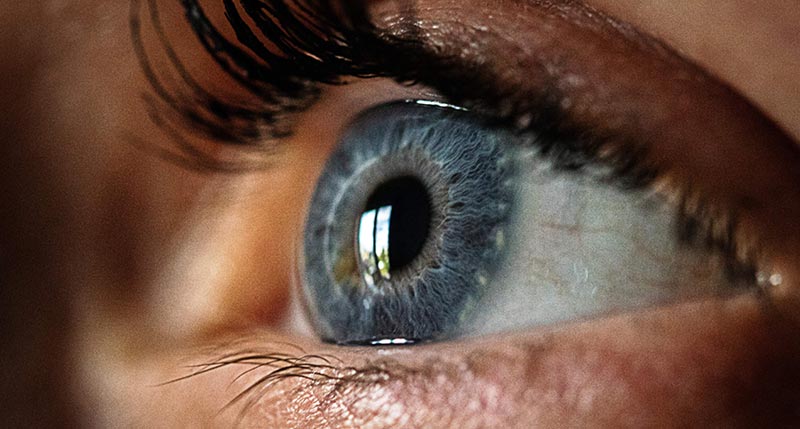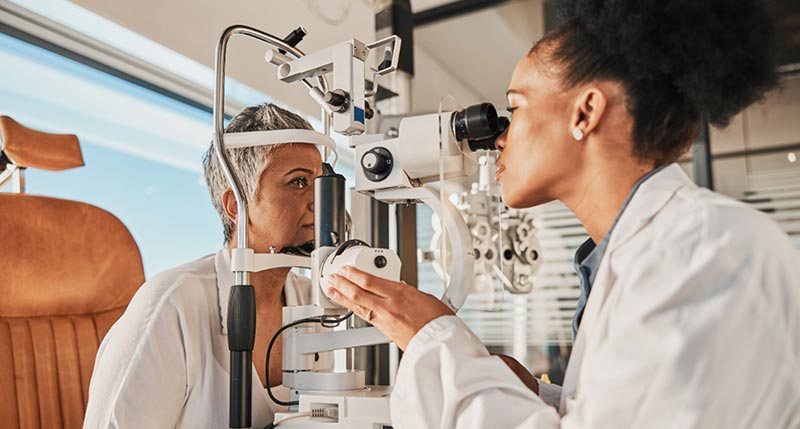Are you the parent of a college student or a new college student yourself? It’s a big responsibility!
College days are full of excitement and learning. Sometimes you learn in a classroom, and sometimes you learn things from friends in a dorm or other social setting. But what you don’t want is to learn a lesson at the expense of your eye health.
We see a lot of college students in our practice who suffer from eye issues or diseases that could be prevented by some good basic practices to maintain eye health. When you develop good eye health habits early in life, they will help you protect your precious sense of vision for decades to come.
Here are 7 ways college students—and really, everyone—can protect their eye health.
- Never Share Your Makeup
It’s tempting to try the new eyeliner or mascara that a friend down the hall raves about, and she is happy to loan it to you. But don’t give in to temptation. While it seems like a friendly gesture and is surely intended that way, sharing makeup (or anything that touches your eye) is the most direct, easy way for viral infections such as pink eye to spread. You could also catch other viral or bacterial infections by sharing makeup. If you do develop an infection in your eye, stop wearing eye makeup until the infection clears and throw out your existing eye makeup and replace it with fresh, new cosmetics.
- Watch Those Screens
We mean watch them in the sense of being aware that excess screen time is the No. 1 cause of eye fatigue and digital eye strain! The human eye didn’t evolve to stare intently into a brightly lit screen for hours each day. When we stare at screens so intently, we tend to blink much less often than when not viewing a screen. Blinking serves the important purpose of lubricating your eye. Therefore, blinking less can cause dry eye, which means eyes get tired or itchy, and vision becomes blurry.
So what can you do when you’re pulling an all-nighter studying? Practice the 20-20-20 rule. It’s easy to remember: Every 20 minutes (or so), look up and away from your screen, and focus on something about 20 feet away from you for at least 20 seconds—while blinking normally. This will help your eyes rest and reset.
- Don’t Smoke
New social situations can lead to new temptations for college students. Smoking is one to avoid at all costs. If you’re not a smoker, keep it that way. There’s a reason that so many smokers are trying to quit, and often say they wish they’d never smoked that first cigarette. Fact: It’s much easier to not start smoking than to quit smoking.
Smoking is an evil antagonist to eye health. It can contribute to conditions that cause blindness as you age, including glaucoma and macular degeneration. Not to mention its negative impact on cardiovascular and lung health. Don’t pick up that bad habit.
- Practice Good Contact Lens Hygiene
Do you know the basics of good contact lens hygiene? As a good first step, read the instructions on the bottle of contact lens disinfecting solution that your eye doctor recommends. It’s easy to skip a step late at night or when you’re in a hurry, but don’t.
Prioritize your eye health above all else, even when you’re exhausted. Don’t wear contacts longer than your optometrist recommends. Whether you wear daily, monthly, or two-week lenses, don’t try to prolong the life of a lens for convenience. Never put contact lenses in your mouth to rewet them; saliva is not sterile and can introduce bacteria to your eye, which can cause an infection. Ensure lenses are properly disinfected before reinserting them. If you have daily wear lenses, never sleep in them!
- Wear Those Sunglasses
Not only are they a fun, cool accessory—sunglasses protect your eyes from the sun’s damaging ultraviolet (UV) rays. UV radiation contributes to the formation of cataracts, macular degeneration, and eye cancer. Make sure you’re wearing high-quality lenses that protect your eyes from 100% of both the sun’s UV-A and UV-B types of ultraviolet radiation.
- Prioritize Sleep, Nutrition, and Exercise
While getting a good night’s sleep isn’t a college student’s top priority, it should be. Sleep is the critical time when your brain processes what you’ve learned that day and converts it to long-term memory. It’s also important for eye health: Tired eyes feel dry and gritty, and a lack of sleep can even cause annoying eyelid spasms or eyelid twitches.
Making good food choices, including leafy green vegetables and a rainbow of fruits and other veggies, gives your eyes the vitamins and minerals they need to stay healthy. Regular exercise promotes good blood flow to your entire body—even your eyes. That’s important, as your eyes need healthy blood flow so you can see your best.
- Schedule Your Annual Comprehensive Eye Exam
Your college years can put a strain on the entire visual system. It’s a smart practice to schedule an annual comprehensive eye exam with your optometrist. Did you know that optometric exams reveal information about multiple other bodily systems? Your optometrist can help you catch the warning signs of diabetes, potential stroke, high blood pressure, some cancers, and sexually transmitted diseases, often before other signs are noticeable.
Call us today to schedule your yearly eye exam. We’ll help to ensure you’re seeing your best so you can enjoy all of the excitement of your college years, and beyond!





